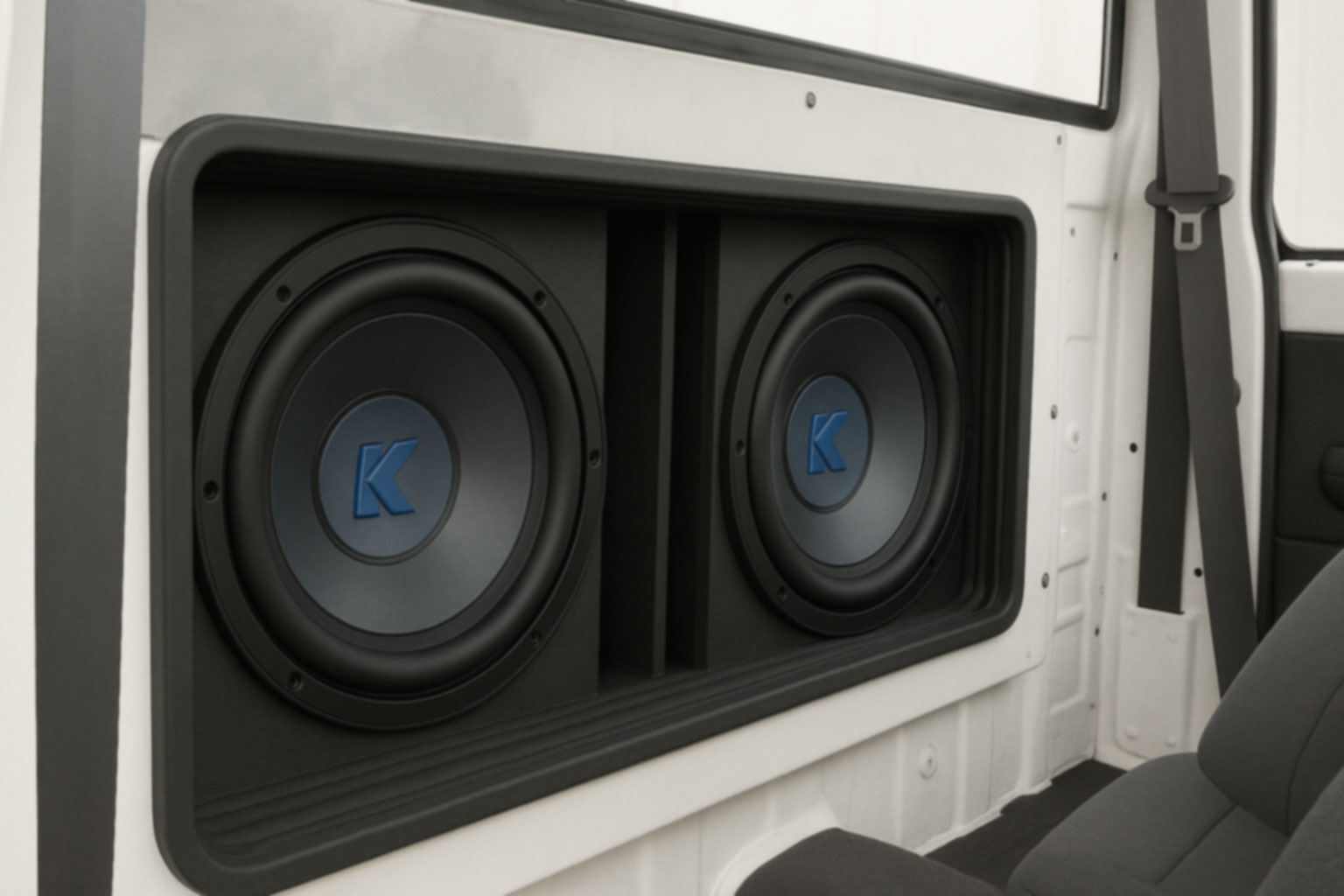
If you want to build and install a subwoofer cabinet in your truck, you’ll need a truck audio blow trough port. This setup lets you pump massive bass into the cab without losing passenger space. The process involves building a custom speaker box, mounting it in the truck bed, and cutting a port that connects the box to the cab.
That’s where a flexible accordion boot comes in. These rubber bellows fill the gap between the cab and the bed, flexing with body movement while keeping everything airtight and watertight.
Before you grab your reciprocating saw, it’s important to understand what you’re getting into. This type of project requires planning and precision. There are things you should know — especially about sealing the open-air gap once you cut the access port in your truck.
What’s a Blow-Through Box?
A truck audio blow through port is basically a hole cut between the cab and the bed. The subwoofer cabinet mounts to the bed with a port that faces the cab, allowing sound to travel directly into the passenger area.
With this setup, you can run large subwoofers without sacrificing interior space. It’s a popular option for serious bass enthusiasts who want to amplify loud, clean, low-end response without cramming a box under the seat.
The Challenge: Securing That Gap
When you cut through the front wall of the bed and the rear wall of the cab, you create an open-air gap. That gap must be sealed before you start running your system.
Without sealing it:
- Air pressure and airflow control will be lost
- Dust, debris, and moisture can enter between the bed and cab.
- The cab may experience extra rumble, resonance, or unwanted “woofer” leakage.
- Vibration and frame flex can increase due to reduced stiffness.
What Makes a Good Sealing Solution
An accordion boot rubber gasket is the perfect way to seal the Truck Audio Blow Through Port.
Here are some key features that make this product work:
| Feature | Why It Matters | What You Get |
|---|---|---|
| Flexibility / Movement Tolerance | The bed and cab move relative to each other due to suspension load, twist, and frame flex. A rigid seal can crack or tear. | EPDM synthetic rubber that remains flexible and durable. |
| Weather / Environmental Resistance | Rain, dust, road grime, and temperature changes can degrade a poor seal. | UV- and ozone-resistant materials for long-term performance. |
| Good Seal Contact Surfaces | The boot must seat cleanly on both the bed and cab edges. | Embedded metal clips clamp securely to flanges and thin wall edges. |
| Acoustic Considerations | You don’t want the boot acting like a second unwanted chamber or port. | Minimal thickness to prevent turbulence or standing waves. |
The Pros
- Massive Bass Output: You can fit much larger subs and boxes in the bed than inside the cab.
- No Lost Cab Space: Keep your interior clean and comfortable.
- Custom Looks: A well-done blow-through grabs attention and sounds incredible.
- Tuning Flexibility: More room to experiment with port volume and design.
The Cons
- Loss of Bed Space: The sub box occupies a large section of your bed.
- Permanent Modification: Cutting into the cab
- Potential Leaks: Water and dust can find any unsealed gap.
- Extra Noise: Poor sealing can lead to increased road noise.
- Complex Build: Requires cutting, welding, and sealing
The Accordion Boot Seal Is Everything
Never underestimate the importance of filling and sealing the gap between your truck cab and bed.
Once you cut that opening, you’re exposing your cab to the outside environment.
That’s why it’s vital to seal the truck audio blow through port properly.
If you don’t, you’ll end up with:
- Water leaks during rain
- Dust and grime entering the cab
- Air pressure loss that affects your bass response
- Unwanted noise while driving
Tips for a Leak-Free Blow-Through
- Use an Accordion Boot: It flexes as the truck moves, maintaining a tight seal.
- Smooth Out Corners: Avoid sharp 90° transitions. Gentle curves make a better seal.
- Measure Accurately: Truck bed and cab edges aren’t always straight. Adjust your cuts so both openings match perfectly.
- Use sound dampening materials to enhance bass response
- Reinforce Edges: Weld or brace the cab wall to prevent flexing.
- Seal Everything: Use automotive-grade weather sealant on bolts, seams, and clamps.
Final Thoughts
Building a truck audio blow through port takes time, tools, and commitment. You’re cutting into your truck — so plan carefully. With the right materials and precise sealing, you’ll end up with a system that’s loud, clean, and weather-tight.
If you’re ready to start your project, check out the Accordion Boot Pass-Through Seals at AccordionBoot.com.
They’re made specifically for truck audio blow through port builds, keeping your cab dry, quiet, and sealed — while letting that bass roll through.
Rubber Boot Seal
You can order rubber boot material for your special project requiring pass through access. These seals are extruded from a durable EPDM synthetic rubber and incorporate a flexible spring steel clip for attachment to any flange. This material is sold by the foot. Choose between accordion boot or compression boot.
TruckAudioBlowThroughPort #TruckAudio #TruckSubwoofers #TruckBass #AccordionBoot #SubwooferEnclosure #BedToCabPassThrough
“Disclosure: This post contains affiliate links, which means we will earn a commission if you click on a link and make a purchase. Please note that all recommendations are based on our honest opinions and that you are under no obligation to use these links. Your support helps us keep the site running and provide valuable content. Thank you!”